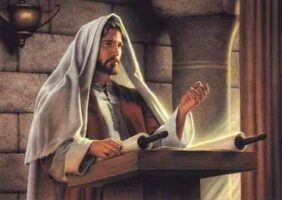Pinchas from a Messianic Perspective

Numbers 25:10-30:1(29:40)
Torah Portion Pinchas is packed with dramatic events and transformative lessons. It kicks off with Phinehas, the grandson of Aaron, taking a bold action against immorality within the Israelite camp. His act of zeal effectively halts a devastating plague, demonstrating how one person’s commitment to righteousness can have a profound impact. The account highlights Phinehas’ bravery and unwavering faith, underscoring the importance of taking a stand against wrongdoing.
In response to Phinehas’ actions, he receives a ‘covenant of peace’ from God, marking a key moment where divine favor and eternal promise are made explicit. This moment not only elevates Phinehas’ status but also sets a precedent for what it means to act with integrity and zeal in the service of God’s commandments.
Pinchas also includes the taking of a census of the Israelites, which serves as an organizing tool for the tribes as they prepare to enter the Promised Land. Through this, we witness a moment of reflection and preparation, setting the stage for future blessings. The census goes beyond the numbers; it is a way of acknowledging each individual’s role in the unfolding divine narrative.
There’s also the forward-looking decision on matters of inheritance, prompted by the daughters of Zelophehad. Their courage in stepping forward to claim their inheritance sparks changes in the legal systems around family inheritance, ensuring fairness and equity. This ties back to the theme of justice, a central element not just in Pinchas, but throughout scripture.
Joshua’s appointment as Moses’ successor is a cornerstone of this portion. It represents continuity and the transfer of leadership based on divine guidance. Moses, despite his immense legacy, must hand over the reins to ensure the continuity of the mission. Joshua exemplifies qualities of strength and obedience, serving as a precursor to the ultimate spiritual leadership embodied in Messianic expectations. The transition from Moses to Joshua is pivotal, symbolizing both change and faithfulness to God’s plan.
Messianic Insights: Finding Messiah Yeshua in Pinchas
Phinehas, with his righteous zeal, can be seen as a precursor to Messiah Yeshua’s fervor for righteousness. His decisive action finds parallel in Yeshua’s cleansing of the temple, driven by a passion for purity and God’s holiness. This connection highlights a shared commitment to stand against corruption and stand for divine principles.
Then Yeshua entered the Temple grounds and began driving out those doing business there, saying to them, “The Tanakh says, `My House is to be a house of prayer,’ but you have made it into a den of robbers!”
(Luke 19:45-46 CJB)
The covenant of peace that Phinehas receives is echoed in the peace that Yeshua offers to humanity. He embodies the ultimate fulfillment of this promise, bringing reconciliation between God and man. Just as the priests mediated for the people, Yeshua acts as the ultimate mediator, paving the way for everlasting peace.
“What I am leaving with you is shalom — I am giving you my shalom. I don’t give the way the world gives. Don’t let yourselves be upset or frightened.”
(John 14:27 CJB)
In the transition of leadership to Joshua, there are profound Messianic elements. Joshua’s role as a leader who carries on where Moses leaves off can be likened to Yeshua’s role as the ultimate shepherd and guide. Yeshua continues the divine narrative, offering guidance and salvation to those who would follow.
The laws regarding inheritance, inspired by the boldness of the daughters of Zelophehad, point to Yeshua as the bearer of a new inheritance. Believers receive an eternal inheritance in Him, a theme Yeshua amplifies through His teachings and promise of an eternal kingdom. This connection to inheritance underscores a spiritual reality brought to life by His mission.
Living the Message: Life Applications for Followers of Yeshua
The story of Phinehas reminds us of the zeal and passion that Yeshua Himself demonstrated. As followers of the Messiah, embracing this fervor in pursuing righteousness can shape our lives significantly. Taking a strong stand against injustice, much like Yeshua did, whether in our communities or personal lives, sets a powerful example.
Yeshua’s teachings often revolve around peace and reconciliation, key themes in Pinchas. Applying His lessons to our relationships encourages harmony and understanding among those around us. Reflecting on how Yeshua advocated for forgiveness and love, especially during His Sermon on the Mount, can be transformative in how we engage with others.
Joshua’s appointment as a leader calls us to recognize our roles in Yeshua’s ongoing mission. We’re encouraged to lead and inspire, much like Joshua did after Moses. Whether it’s in our families, workplaces, or places of worship, adopting a spirit of guidance based on divine principles can make a meaningful impact.
Finally, the concept of spiritual inheritance as seen in the story of the daughters of Zelophehad urges us to embrace and act on our promises through Messiah. Being conscious of the eternal life promised to us and the spiritual gifts we inherit motivates us to live purposefully. This inheritance is not just a distant promise but a present reality to draw strength and inspiration from daily.
Dale Solberg is a guest writer at Messianic Torah Portion offering a commentary and devotional thoughts from a Messianic Perspective on each week’s Torah reading. His views and opinions do not necessarily reflect those of The Messianic Light. You can reach Dale at dale@messianictorahportion.com.
Unless otherwise noted, Scripture quotations are taken from the Complete Jewish Bible, Copyright © 1998 and 2016 by David H. Stern. Used by permission. All copyrights reserved worldwide.
This post contains affiliate links. Purchases help support Messianic Torah Portion and do not affect the price you pay. Please do not make purchases on the Sabbath.
Messianic Torah Portion is a ministry of The Messianic Light.

Comments
Pinchas from a Messianic Perspective — No Comments
HTML tags allowed in your comment: <a href="" title=""> <abbr title=""> <acronym title=""> <b> <blockquote cite=""> <cite> <code> <del datetime=""> <em> <i> <q cite=""> <s> <strike> <strong>